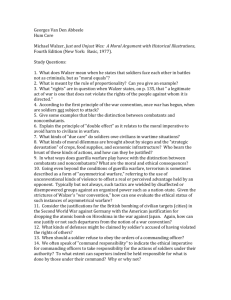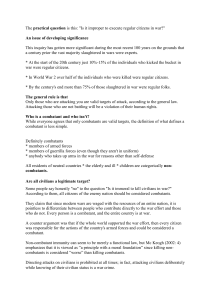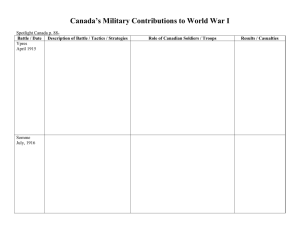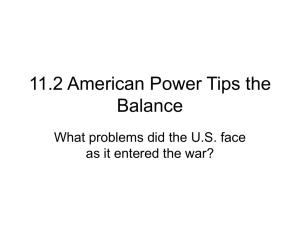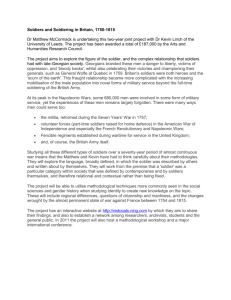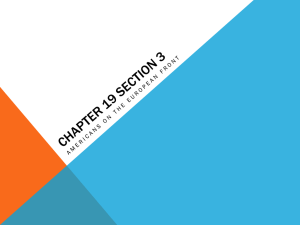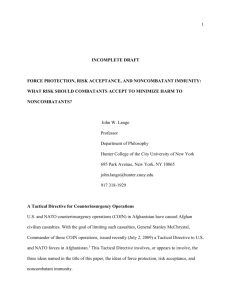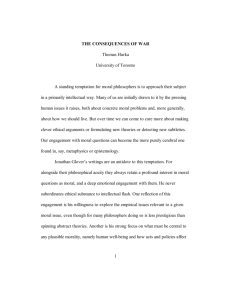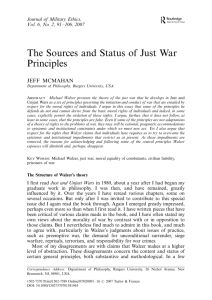David Underhill – 25 Oct to 29 Oct 04 (Week 9) – The Ethics of War
advertisement
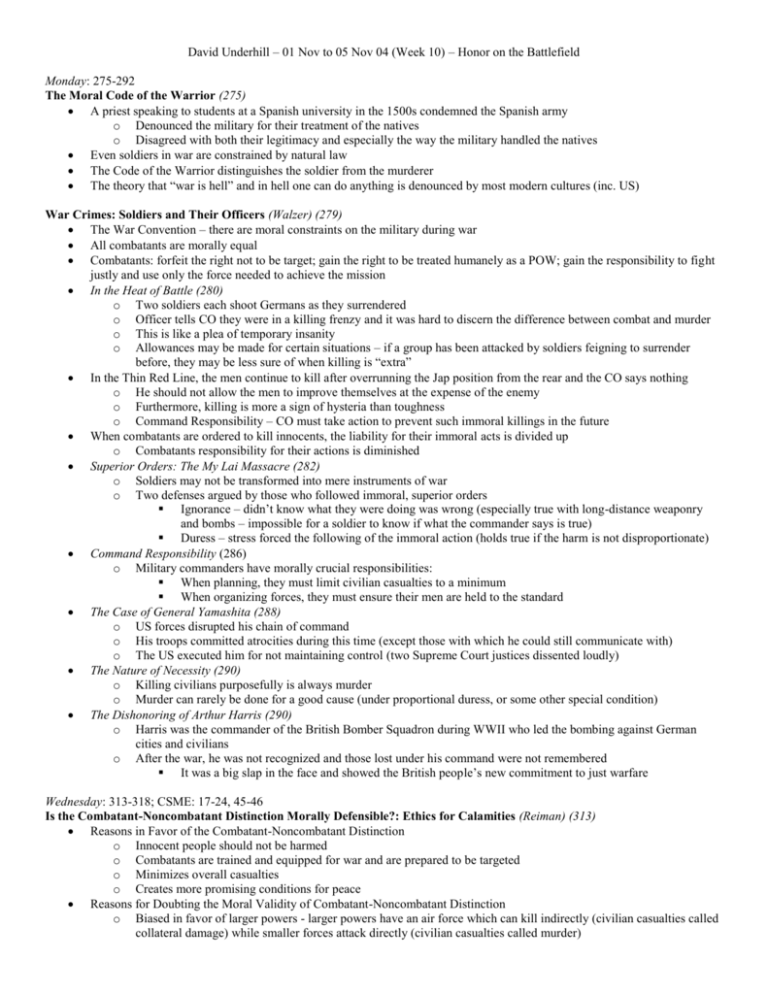
David Underhill – 01 Nov to 05 Nov 04 (Week 10) – Honor on the Battlefield Monday: 275-292 The Moral Code of the Warrior (275) A priest speaking to students at a Spanish university in the 1500s condemned the Spanish army o Denounced the military for their treatment of the natives o Disagreed with both their legitimacy and especially the way the military handled the natives Even soldiers in war are constrained by natural law The Code of the Warrior distinguishes the soldier from the murderer The theory that “war is hell” and in hell one can do anything is denounced by most modern cultures (inc. US) War Crimes: Soldiers and Their Officers (Walzer) (279) The War Convention – there are moral constraints on the military during war All combatants are morally equal Combatants: forfeit the right not to be target; gain the right to be treated humanely as a POW; gain the responsibility to fight justly and use only the force needed to achieve the mission In the Heat of Battle (280) o Two soldiers each shoot Germans as they surrendered o Officer tells CO they were in a killing frenzy and it was hard to discern the difference between combat and murder o This is like a plea of temporary insanity o Allowances may be made for certain situations – if a group has been attacked by soldiers feigning to surrender before, they may be less sure of when killing is “extra” In the Thin Red Line, the men continue to kill after overrunning the Jap position from the rear and the CO says nothing o He should not allow the men to improve themselves at the expense of the enemy o Furthermore, killing is more a sign of hysteria than toughness o Command Responsibility – CO must take action to prevent such immoral killings in the future When combatants are ordered to kill innocents, the liability for their immoral acts is divided up o Combatants responsibility for their actions is diminished Superior Orders: The My Lai Massacre (282) o Soldiers may not be transformed into mere instruments of war o Two defenses argued by those who followed immoral, superior orders Ignorance – didn’t know what they were doing was wrong (especially true with long-distance weaponry and bombs – impossible for a soldier to know if what the commander says is true) Duress – stress forced the following of the immoral action (holds true if the harm is not disproportionate) Command Responsibility (286) o Military commanders have morally crucial responsibilities: When planning, they must limit civilian casualties to a minimum When organizing forces, they must ensure their men are held to the standard The Case of General Yamashita (288) o US forces disrupted his chain of command o His troops committed atrocities during this time (except those with which he could still communicate with) o The US executed him for not maintaining control (two Supreme Court justices dissented loudly) The Nature of Necessity (290) o Killing civilians purposefully is always murder o Murder can rarely be done for a good cause (under proportional duress, or some other special condition) The Dishonoring of Arthur Harris (290) o Harris was the commander of the British Bomber Squadron during WWII who led the bombing against German cities and civilians o After the war, he was not recognized and those lost under his command were not remembered It was a big slap in the face and showed the British people’s new commitment to just warfare Wednesday: 313-318; CSME: 17-24, 45-46 Is the Combatant-Noncombatant Distinction Morally Defensible?: Ethics for Calamities (Reiman) (313) Reasons in Favor of the Combatant-Noncombatant Distinction o Innocent people should not be harmed o Combatants are trained and equipped for war and are prepared to be targeted o Minimizes overall casualties o Creates more promising conditions for peace Reasons for Doubting the Moral Validity of Combatant-Noncombatant Distinction o Biased in favor of larger powers - larger powers have an air force which can kill indirectly (civilian casualties called collateral damage) while smaller forces attack directly (civilian casualties called murder) Moral responsibility should be dependent on both consequences and intent Walzer criticizes the doctrine of double effect for not imposing a duty to minimize harm to civilians o The combatant-noncombatant distinction does not line up with the guilty-innocent distinction Noncombatants are often the guilty ones (producing war materials, driving capitalism if that’s the other side’s ‘enemy’, etc) and combatants are often innocent Justifications for Abandoning the Combatant-Noncombatant Distinction o Most people are Kantian, except when it comes to large-scale thinking (then they become utilitarianism) – largescale makes Kant inappropriate o Combatants and noncombatants are both members of the enemy, eroding the distinction between them o Noncombatant civilians have some responsibility for what their gov does People with special relationships with susceptible people are responsible for their care As the harmfulness of an action goes up, more sacrifice is expected to prevent it Principle of calamity ethics – citizens have an obligation to stop the gov from committing large-scale harm Interdiction in Afghanistan (Schoultz) (17) Spec Ops asked if they can do a mission the next morning to stop a convoy of al-Qaeda leaders driving to the Pakistan border There is little time to prepare but they get ready and go after the targets Helos and SEAL/Ranger teams engage two vehicles and take them out (filled with terrorists and weapons) LCDR Reynolds thinks he sees a woman in the car and has his helo gunner hold his fire o Puts the bird at risk (SA-7 could have taken out the entire team and helo) o Lands a few hundred yards in front and stops the vehicle o Turns out he is right Back at base MAJ Wyatt was upset about the risk o Reynolds claims it was the moral thing to do based on his observations o Wyatt says it was extremely dangerous and a poor decision and says they were very lucky Incident at Roadblock (ed. Shannon French) (45) Soldiers have to move through a city after parachuting in the night before All inhabitants had to be off the streets by 8PM The soldiers setup up barriers and stationed guards with loudspeakers and native speakers at intersections Tanks are also present to ward off anyone venturing nearby A bus comes driving at the barrier and refuses to stop despite warnings o The occupants are dressed like the opposition forces and are firing shots o When it comes across the barriers, the soldiers open fire, killing all but the driver o They turn out to be joy riders, not opposition forces o The officer asks the driver why they didn’t stop; says they just wanted to see if the soldiers would actually open fire Friday: 307-312 Winning and Fighting Well (Walzer) (307) Battle of the River Hung o The Duke allowed the other army to completely form up before attacking o His army was weaker and lost o “I will not sound my drums to attack an unformed host” Mao Tse-tung said “we have no use for his asinine ethics” o Argued guerrillas could not take prisoners o Either disperse or execute – a tactical decision If rules can be broken for the sake of cause, then rules have no standing in any war worth fighting Sliding Scale Argument (309) Sliding Scale (extreme form) – soldiers who fight a just war may do anything useful to fighting o General Sherman held this view o Soldiers won’t kill civilians for the sake of killing, but will kill them if it advances their mission Deciding against the sliding scale requires a position of moral absolutism according to many o Requires one to do justice even if the heavens fall Implausible for most Another alternative – do justice until the heavens are about to fall o Utilitarian extreme – restrains military action to usefulness and proportionality Dealing with the tension between the rules of war and the theory of aggression (310) War convention is set aside in favor of utilitarianism Convention slowly gives in based on the moral urgency of the cause Convention is overridden only in the most extreme circumstances Convention holds and right are respected regardless of consequences
